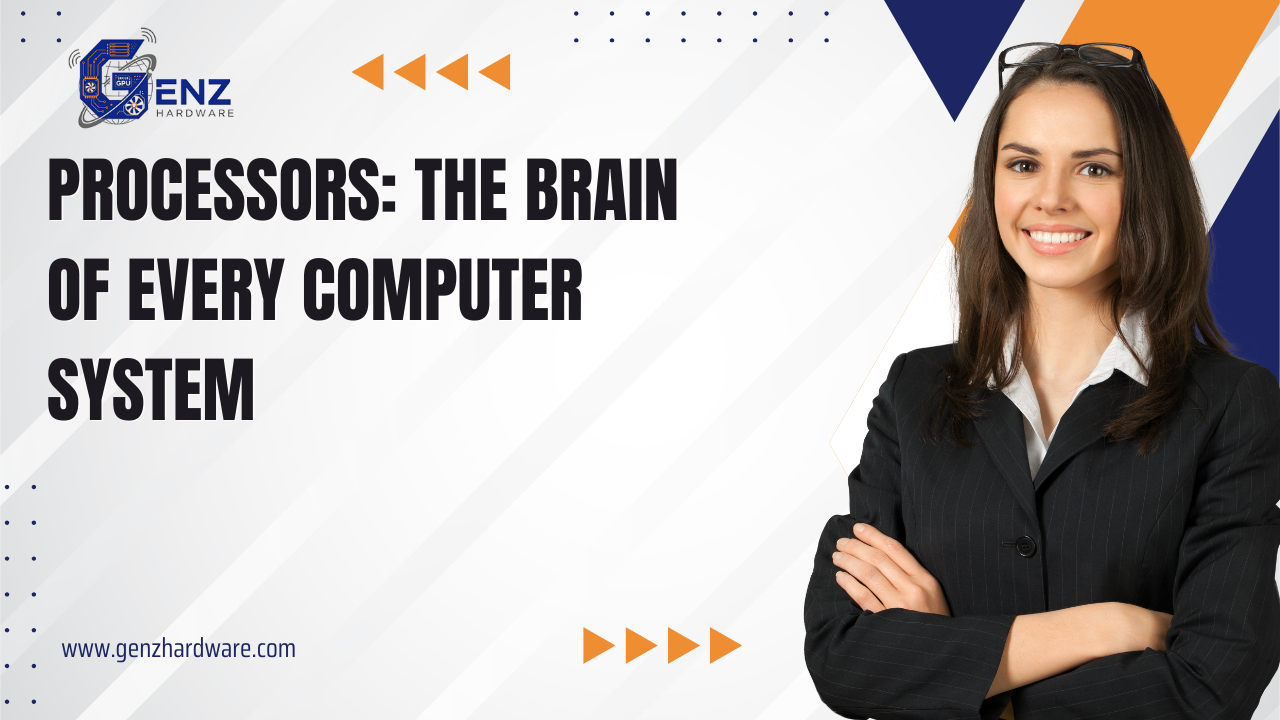
Processors: The Powerhouse Behind Every Computer
At the core of every computing device lies the processor, often called the Central Processing Unit (CPU) — the single most important component that determines how fast, efficient, and powerful your system is. From simple office tasks to high-end gaming and server workloads, the processor dictates how smoothly your computer performs.
A strong processor can transform your system’s capabilities, enabling faster loading times, multitasking, and overall system responsiveness. Whether you’re using a desktop, laptop, or server, choosing the right processor is crucial for meeting your performance needs.
What Is a Processor?
A processor (CPU) is a silicon chip that carries out instructions from software applications and the operating system. It performs billions of calculations per second, handling everything from basic tasks like typing and browsing to advanced operations like 3D rendering, data analysis, and artificial intelligence.
Think of it as the brain of your computer, where every operation — from opening a file to running a game — begins and ends.
Types of Processors:
-
Desktop Processors
-
Optimized for performance, multitasking, and gaming.
-
Commonly used in personal computers and workstations.
-
-
Laptop Processors
-
Focus on power efficiency and thermal management.
-
Deliver balanced performance for portable computing.
-
-
Server Processors
-
Designed for heavy workloads, virtualization, and data center use.
-
Support multi-core architectures and error-correcting features.
-
-
Mobile & Embedded Processors
-
Found in smartphones, tablets, and IoT devices.
-
Prioritize energy efficiency and compact size.
-
Key Specifications to Consider:
-
Clock Speed (GHz): Determines how fast a processor can execute instructions.
-
Core Count: More cores allow better multitasking and parallel processing.
-
Cache Memory: Temporary storage for faster access to frequently used data.
-
Threads: Logical divisions within each core that boost performance.
-
TDP (Thermal Design Power): Indicates how much heat the processor generates.
-
Socket Type: Defines compatibility with your motherboard.
Popular Processor Brands:
-
Intel: Known for Core i3, i5, i7, i9, and Xeon series processors — offering powerful options for both personal and enterprise use.
-
AMD: Renowned for Ryzen and EPYC processors, delivering excellent multi-core performance and value.
-
Apple Silicon (M-Series): Custom ARM-based chips offering outstanding power efficiency and integration for Mac devices.
Why Processors Matter:
-
System Speed: A powerful CPU dramatically improves system responsiveness.
-
Multitasking: Handle multiple applications simultaneously without lag.
-
Gaming & Graphics: High-end processors boost frame rates and reduce latency.
-
Productivity: Faster processing means less waiting and more output.
-
Longevity: A quality CPU ensures your system stays relevant for years.
Choosing the Right Processor:
When selecting a processor, consider your needs:
-
For everyday tasks, a dual- or quad-core CPU like Intel i5 or AMD Ryzen 5 is ideal.
-
For content creation or gaming, look for higher clock speeds and more cores (i7, Ryzen 7, or above).
-
For servers or enterprise systems, opt for Xeon or EPYC series processors with ECC memory support.
Always ensure your processor is compatible with your motherboard chipset, RAM type, and cooling system.
Conclusion:
The processor is the driving force behind every computing task — defining your system’s speed, responsiveness, and overall capability. From basic browsing to complex data processing, every click and command passes through the CPU.
By choosing a processor that matches your performance requirements, you ensure your system operates efficiently today and remains future-ready for tomorrow’s technology.








